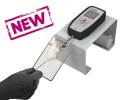Authors
M. Steiner, H. Lecourt, A. Rakotoariniaina, F. Jenck.
Lab
Actelion Pharmaceuticals Ltd., Switzerland,
Journal
Behavioural Brain Research
Abstract
The fear-potentiated startle (FPS) and the light-enhanced startle (LES) paradigms are rodent tests of fear and anxiety, which combine face validity with predictive validity for clinically effective anxiolytic drugs. However, systematic strain comparisons aimed at identifying a rat strain that shows robust and reliable fear and anxiety responses in both models are missing. Here, we investigated four commonly used laboratory rat strains: Wistar, Sprague Dawley, Long-Evans and F344. Following strong cued fear conditioning training [60 conditioned stimulus-unconditioned stimulus (CS-US) pairings], all strains except Wistar exhibited significant FPS responses. F344 rats showed the strongest FPS response. Following milder cued fear conditioning protocols, designed to reduce the underlying component of contextual fear conditioning (by context pre-exposure or less CS-US pairings), also Wistar rats were able to show significant FPS, albeit still to a lesser extent than F344 rats tested under identical conditions. When tested in the LES protocol (light intensity _ 1500 lx), all strains except Long-Evans displayed significant light-enhanced startle responses. F344 and Wistar showed the strongest LES responses, which were of similar magnitude. The most sensitive strain in both paradigms, F344, was chosen for further pharmacological validation. The clinically active anxiolytic alprazolam (0.3, 1, 3mg/kg p.o.) dose-dependently reduced both fear-like responses in the FPS paradigm and anxiety-like responses in the LES paradigm at non-myorelaxant dosages. We propose that the F344 rat strain is particularly suited for the predictability assessment of novel anxiolytic drugs in both startle paradigms.
BIOSEB Instruments Used:
Grip strength test (BIO-GS3)

 Pain - Thermal Allodynia / Hyperalgesia
Pain - Thermal Allodynia / Hyperalgesia Pain - Spontaneous Pain - Postural Deficit
Pain - Spontaneous Pain - Postural Deficit Pain - Mechanical Allodynia / Hyperalgesia
Pain - Mechanical Allodynia / Hyperalgesia Learning/Memory - Attention - Addiction
Learning/Memory - Attention - Addiction Physiology & Respiratory Research
Physiology & Respiratory Research
 Pain
Pain Central Nervous System (CNS)
Central Nervous System (CNS) Neurodegeneration
Neurodegeneration Sensory system
Sensory system Motor control
Motor control Mood Disorders
Mood Disorders Other disorders
Other disorders Muscular system
Muscular system Joints
Joints Metabolism
Metabolism Cross-disciplinary subjects
Cross-disciplinary subjects Happy new year 2025
Happy new year 2025 